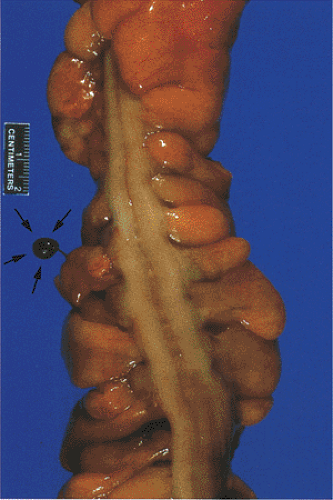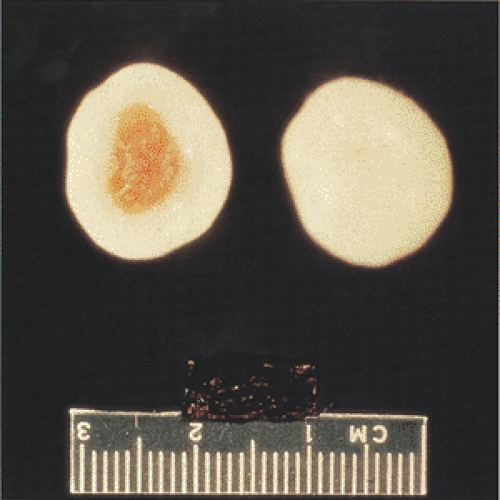Miscellaneous Lesions
Torsion of Appendices Epiploica (Epiploic Appendagitis)
The appendices epiploica lie along the entire colon from the cecum to the upper part of the rectum. Torsion or vascular thrombosis causes their infarction (Fig. 13.180), hemorrhage
into the fatty tissues, abscess, or stricture formation. Appendices epiploica may also autoamputate and lie freely in the peritoneal cavity, where they may calcify and turn into “peritoneal mice” (Fig. 13.181). Histologically, they consist of fat that may appear infarcted and completely surrounded by a dense fibrous capsule or may show variable degrees of fat necrosis and calcification, again surrounded by fibrous material.
into the fatty tissues, abscess, or stricture formation. Appendices epiploica may also autoamputate and lie freely in the peritoneal cavity, where they may calcify and turn into “peritoneal mice” (Fig. 13.181). Histologically, they consist of fat that may appear infarcted and completely surrounded by a dense fibrous capsule or may show variable degrees of fat necrosis and calcification, again surrounded by fibrous material.
 FIG. 13.180. Infarcted appendix epiploica (arrows). The appendix epiploica hangs by a thin strand from the pericolonic fat. It has undergone torsion and become infarcted, hence its dark color. |
Irritable Bowel Syndrome
Irritable bowel syndrome is the most common gastrointestinal disorder encountered in general and gastroenterology practices (624,625). It is characterized by abdominal pain, altered bowel habits (diarrhea or constipation), bloating, or the passage of mucus per rectum. A number of criteria have been advanced to standardize the clinical diagnosis (626). The condition develops in women more often than men, often in those with underlying depression or anxiety. Subtle but nonspecific histopathologic changes can be found in patients with this diagnosis. These include increased numbers of mucosal lymphocytes, mast cells, endocrine cells, and nerve cells as summarized by Kirsch and Riddell (627).
Stay updated, free articles. Join our Telegram channel

Full access? Get Clinical Tree








